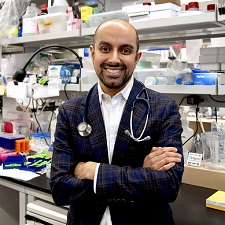Rabi Upadhyay, MD
Rabi Upadhyay, MD

Immunotherapies using checkpoint inhibitors have shown amazing results in certain solid cancers. However, there are vast differences in treatment outcomes for patients who have remarkably similar cancers (based on histology and genetics) and many patients develop resistance. In addition, predicting who will benefit from the treatment has been unreliable. Recent research found that the diversity and specific quality of microbes that colonize the intestines (the gut microbiome) can impact the success of cancer immunotherapy, but there is no consensus about the underlying mechanisms. Dr. Upadhyay aims to build a mouse model of lung cancer that replicates the previous findings and then dissect the intricate biology between the gut microbiota and tumors in the lung. He plans to further define the cells and molecules involved, with the hope that more effective immunotherapy treatments can be designed for patients.
